Strength in Numbers
As he signed the Declaration of Independence in 1776, Ben Franklin famously said, “If we don’t all hang together, we will all hang separately.” That is, if we patriots don’t stay close and stay strong, the British will divide us, conquer us—and hang each one of us.
In military terms, this is a core concept: Wise generals know to keep their force united, lest individual elements be attacked separately and defeated in detail.
We can add that the same point about the value of unity also applies to smaller battle situations, in which group psychology plays an important role. The anthropological term for the power of togetherness is synchrony; it explains why soldiers enjoy higher morale when they march in formation and why they fight better when they stay in a group.
This principle of unity applies, as well, to political combat—the more concentrated the mass, the better. And it applies particularly to Washington’s periodic media feeding-frenzies, such as the one we’re seeing today over the White House “whistleblower.”
So we come to a key takeaway involving, yes, the importance of political solidarity. It’s true that sometimes in difficult political situations it might seem that the safest course of action is “every man for himself,” and yet, far more often there’s more safety, as well as strength, to be found in unity—including the unity of staying on message.
1974 and 1998
We can look back to history to see how this dynamic—solidarity, or not—has played out:
During the Watergate investigation, 1972-74, many congressional Republicans split away from their fellow Republican, President Richard Nixon. In the course of that two-year ordeal, Washington was a feeding frenzy of leaky independent counsels, impeachment-bent Democrats, and thirsting-for-blood reporters; in the middle of this mess, many Republicans figured that they could save themselves by abandoning Nixon.
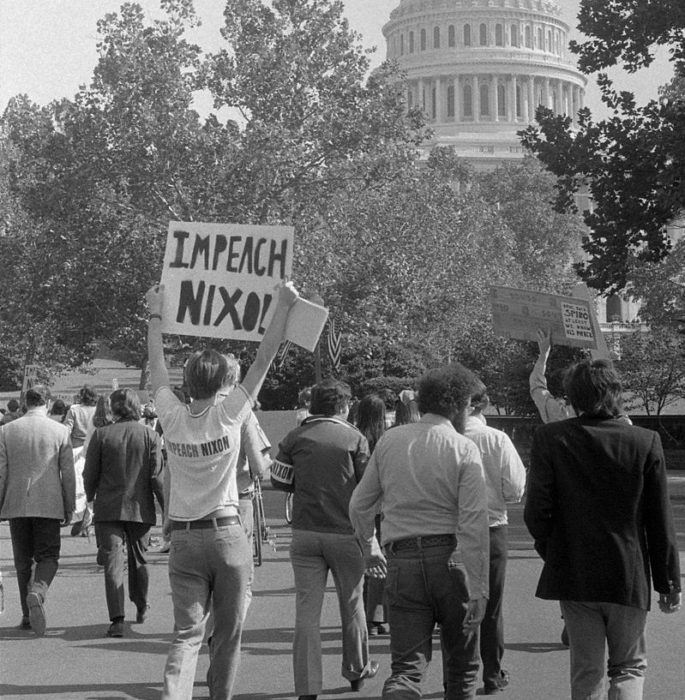
Demonstrators in Washington, DC, demanding that Congress impeach President Nixon in 1973. (Wikimedia)
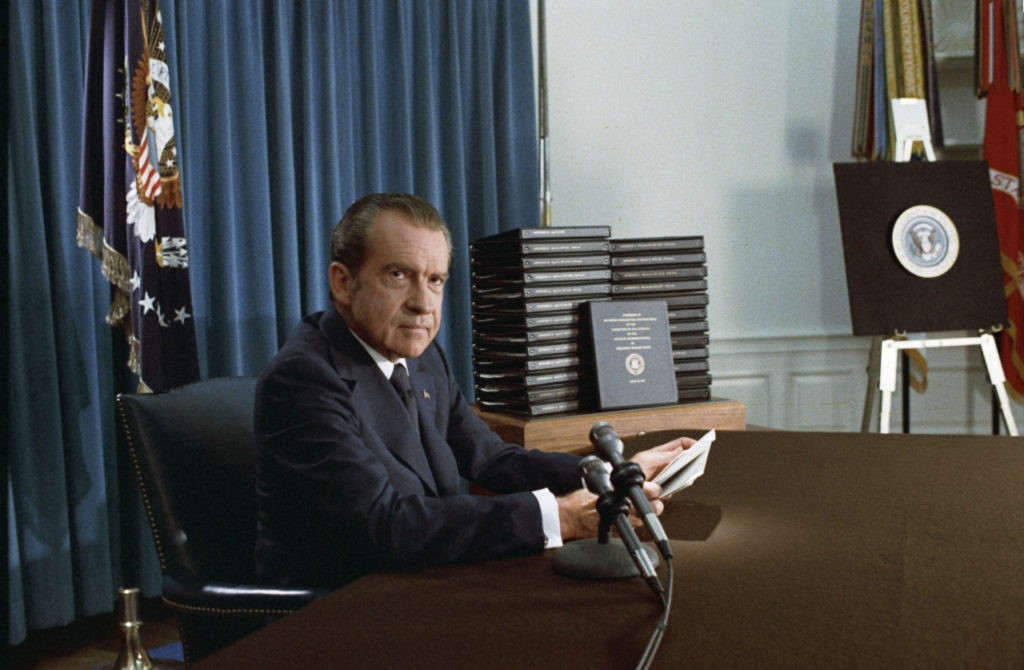
President Richard Nixon with his edited transcripts of the White House tapes subpoenaed by the special prosecutor, during his speech to the nation on Watergate in 1974. (Nixon Library)

President Richard Nixon gives his famous “V” sign as he departs the White House for the last time. (Nixon Library)
At the same time, many other Republicans chose to stick with Nixon. Why? Some GOPers simply believed that the 37th president hadn’t done anything wrong, although probably more thought that whatever he might have done, it was no worse than what was done by his predecessors in the White House; Victor Lasky chronicled prior presidential skullduggery in an underground classic from that era, It Didn’t Start With Watergate.
Yet Republican stalwarts were undercut and isolated when other Republicans broke ranks. Most famously, there was Sen. Howard Baker of Tennessee, who always asked, in his TV-soundbite twang, “What did the president know, and when did he know it?” Baker’s question could be construed as neutral, and yet there was always another layer of meaning in his voice; the subtext was, What did the president know—and when will we find out?
Meanwhile, other Republicans, such as Sen. Lowell Weicker of Connecticut, were openly hostile to Nixon and happy to help force him out of office.
So we can see: During Watergate, Republicans did not put up a united front; they broke ranks and scattered every which way. As a result, facing the inevitability of bipartisan impeachment and conviction, in August 1974, Nixon resigned. In a televised speech announcing his resignation, he put the end of his presidency in starkly political terms: “I no longer have a strong enough political base in the Congress to justify continuing that effort”—that effort, of course, being the fight against impeachment and conviction.
Yet even though Republicans had scattered during Watergate, three months later, in November 1974, the GOP was clobbered in the midterm elections; the party lost four seats in the Senate and 49 seats in the House. Indeed, plenty of Republicans who had supported impeachment were defeated, including Rep. Larry Hogan of Maryland—the father of the current governor. (We can also add that both Baker and Weicker later ran for president; neither got very far, as Republican activists had not forgotten their anti-Nixon positioning; the next GOP presidential nominations went to Gerald Ford, Ronald Reagan, George H.W. Bush, and Bob Dole—all Nixon loyalists.)
Okay, so now we can skip ahead a quarter-century, to see what happens when a party sticks with its president. Short version: Unity works better.
During the 1998-99 investigation and impeachment of Bill Clinton—Monica Lewinsky, the blue dress, perjury, and all that—congressional Democrats rallied to defend the embattled 42nd president, as well as their individual seats.
In fact, during the investigation, Democrats didn’t just play defense; they actively went on offense. Democrat and allied media-diggers uncovered extramarital affairs in the private lives of top Republicans, including Reps. Bob Livingston and Henry Hyde. And those Republicans who couldn’t be painted as sexual hypocrites were trashed as censorious religious-right zealots. (Poor Monica Lewinsky: She was victimized too soon; it would be another two decades before the Harvey Weinstein case got liberals interested in defending victimized women.)

Monica Lewinsky and her stepmother, Barbara Lewinsky, push through a large crowd of media as they leave a Santa Monica restaurant Thursday February 5, 1998. (AP Photo/Nick Ut)

In this image taken from video, Monica Lewinsky watches President Bill Clinton as he greets White House staff members on the South Lawn of the White House on November 6, 1996, during a victory celebration after his reelection. (AP Photo/APTV)

President Bill Clinton speaks to reporters January 26, 1998, about his alleged affair with former White House intern Monica Lewinsky. Clinton vehemently denied the allegations saying, “I did not have sexual relations with that woman, Miss Lewinsky, I never told anybody to lie, not a single time.” (JOYCE NALTCHAYAN/AFP/Getty Images)

Rep. Bob Livingston, shown in this television image, acknowledges other members of the House right after calling for President Bill Clinton to resign, and just before announcing his own resignation from Congress, during the House session December 19, 1998, during debate on the four articles of impeachment against President Clinton. (APTN/AP Photo)
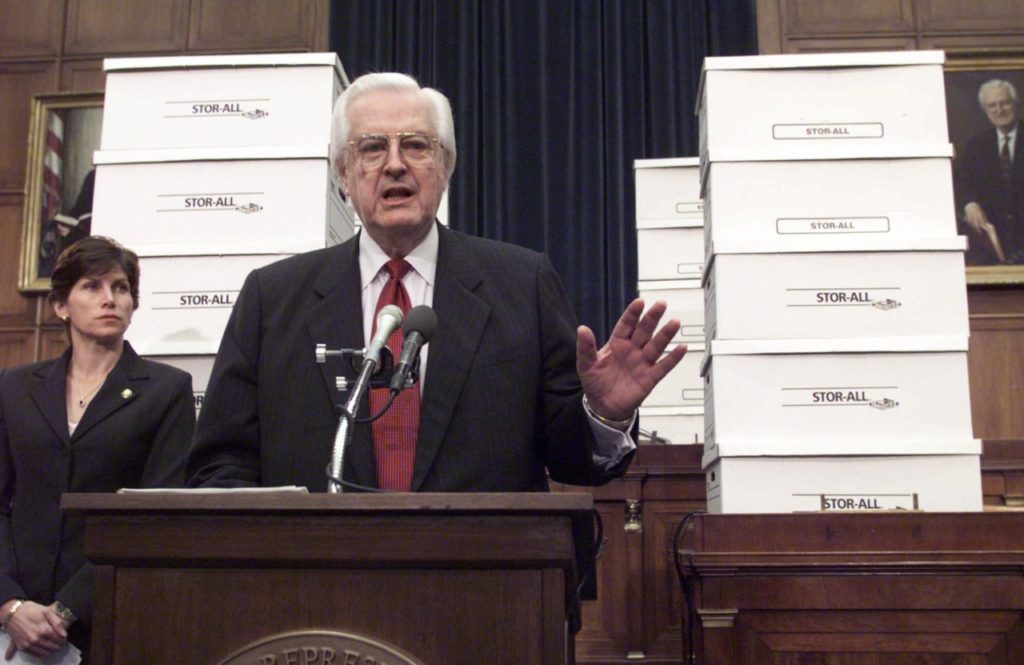
Surrounded by boxes of evidence against President Bill Clinton, House Judiciary Committee Chairman Rep. Henry Hyde, accompanied by committee member Rep. Mary Bono, gestures during a Capitol Hill news conference on December 7, 1998, to say that the committee has “made a compelling case” for impeachment against the president. (Joe Marquette/AP Photo)
For the Democrats, the kitchen-sink strategy worked: In the 1998 midterm elections—which historical cycles said should have gone against them—they broke even in the Senate (one of those senatorial gainers was New York’s Chuck Schumer), and gained five seats in the House. It was a stupendous political upset, breaking any chance that Congress would actually remove Clinton from office.
So if we compare the results of 1974 to those of 1998, it’s obvious: It’s best to stay together and not lose cohesion. And oh yes, there’s a further point: The best defense is a good offense.
Did the Democrats Walk into a Trap of Their Own Making?
Okay, so now let’s move from Watergate and Monicagate to the new Beltway uproar: Russiagate—oops, that’s old news; maybe the Democrats will soon be calling it Ukrainegate, or Whistleblowergate. Or perhaps they’ll simply call it, Destroy Trump.
Interestingly, some Democrats have concerns about this new course; they are reminding themselves that the 2020 election is barely more than a year away—so why winch up the whole impeachment effort now? Why shift the focus from their presidential candidates to less popular figures, such as Nancy Pelosi and the Capitol Hill gang?
Hence this revealing CNN headline from September 25: “Some Democrats worry Pelosi may have acted too soon on impeachment.” As the article detailed, “There is grumbling about what happens if the transcript and report are not the smoking guns that everyone is hyping them to be.”
Indeed, when the transcript of President Trump’s July 25 phone conversation with Ukrainian President Volodymyr Zelensky was released, the “smoking gun” that the Democrats had been hoping for was shown not to be smoking—and actually, it wasn’t even a gun.

President Donald Trump and Ukrainian President Volodymyr Zelensky on September 25, 2019, on the sidelines of the United Nations General Assembly. (SAUL LOEB/AFP/Getty Images)
Respected election-caller Charlie Cook commented, “I was totally underwhelmed by the transcript … This will not move malleable voters.” In that same deflated spirit, New York Times columnist Frank Bruni warned Democrats of the road ahead:
Any scenario is possible, including one in which impeachment redounds to Trump’s benefit and increases the chances of his re-election, because he paints himself a martyr, eludes conviction in the Senate, frames that as exoneration and watches his fans mobilize and turn out as never before.
Another Times columnist, David Brooks, was even more direct in warning Democrats against impeachment, saying that the American people would conclude that an arrogant capital was seeking to take power away from mere voters. Brooks summed up the gist of the message: “Democratic elites to voters: We don’t trust you. Too many of you are racists!”
Even the Times’ editorial board, the cheerleading flagship of national liberalism, conceded the risk to Democrats: “Mr. Trump has long argued—and continues to argue—that impeachment will benefit him politically. Many Democrats, including Ms. Pelosi, have not disputed that possibility.”
Breitbart News, of course, was more blunt: One of its headlines read, “Democrats Privately Panic Following Transcript, Impeachment Fallout.”
The danger for Democrats, of course, is that impeachment will turn out like the Brett Kavanaugh confirmation hearings last year, when the televised fireworks of September 2018 galvanized Republican voters and helped the GOP gain two Senate seats in the November elections.
So yes, the Democrats have their doubts about their current impeachment course. And yet they also know that it’s vital to stay united. Indeed, they further know, from 1998, that it’s even better to stay united while on the attack. So that’s what they’re doing—they’re acting as an army, going on the offensive.
AOC Blows the Trumpet
On September 25, Rep. Alexandria Ocasio-Cortez sounded the Democrats’ call to arms. Ignoring the obvious words on the page, she tweeted of the just-released Trump-Zelensky transcript, “It’s worse than we thought … We have no choice but to impeach.” As we have learned over the last century, falsehoods get “truthier” with repetition—at least that’s what demagogues strive for.

Rep. Alexandria Ocasio-Cortez answers questions from reporters while entering a House Democrat caucus meeting at the U.S. Capitol where formal impeachment proceedings against President Donald Trump were announced by Speaker of the House Nancy Pelosi September 24, 2019, in Washington, DC. (Win McNamee/Getty Images)
For its part, the Mainstream Media has been happy to fall in with the Democrats’ assault formation. Of course, reporters have their own wily ways; one favorite MSM tactic is to report on “splits” within Republican ranks, in the hope of wedging them wider.
The hope, of course, is that Sen. Mitt Romney, that opportunistic Trump-hater, can be multiplied—or metastasized. So here’s a helpful headline in the Washington Post: “Cracks emerge among Senate Republicans over Trump urging Ukrainian leader to investigate Biden.” And this headline in Politico: “Republicans twist as Trump’s Ukraine storm rages.” Such stories are notable for their lack of specifics, and yet for the Democrats, they are usable, serving the cause, they hope, of creating more Romney-type renegades.
Yet interestingly, the Democrats are attacking Trump for supposedly doing what they themselves have admitted to doing—namely, pushing Ukraine around. Yes, as we all know, Joe Biden, father of Hunter, bragged in a public forum last year that he had muscled Ukrainian officials: “If the prosecutor is not fired, you’re not getting the money.”
In addition, as conservative pundit Marc Thiessen has pointed out, congressional Democrats, too, have sought to muscle Ukraine into changing its policies in order to advance their own political goals.
So yes, without a doubt, Democrats—joined, of course, by the MSM—are going to make an all-out push against Trump. They are finally following through on Rep. Rashida Tlaib’s notorious war whoop from January, “We’re going to impeach the motherf**ker!”
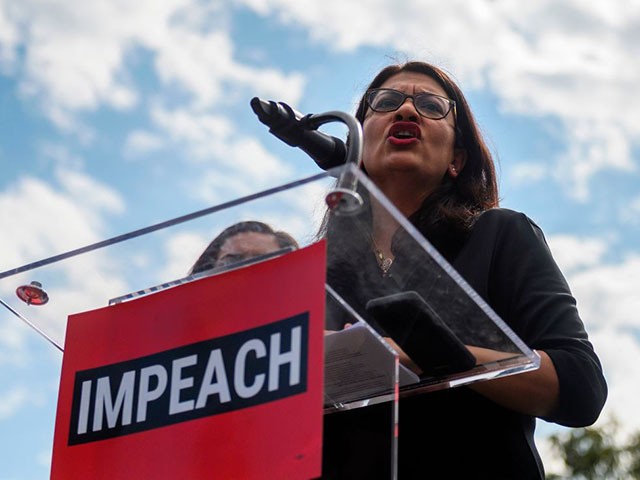
Rep. Rashida Tlaib speaks during the “People’s Rally for Impeachment” on Capitol Hill in Washington, DC, on September 26, 2019. (ANDREW CABALLERO-REYNOLDS/AFP/Getty Images)
So on September 25, former top Trump strategist Stephen K. Bannon was right to put the Democrats’ offensive in an appropriately martial context: “Pelosi’s announcement … was the shot at Fort Sumter.” In other words, Team Trump must be fully mobilized in its own defense.
In the meantime, the Ukraine-related details—more precisely, the allegations—keep coming fast and furious; by now it’s hard to recall that the original report about a “whistleblower” came only on September 18. And yet just in the past week or so, Democrats have worked themselves into a fury. Indeed, every day—seemingly every hour—brings a new accusatory headline, even if oftentimes the story soon falls apart.
Given this level of anything-goes enthusiasm, it matters little that the whistleblower’s complaint, released on September 26, contains no proof of wrongdoing and simply lots of argumentation about policy—which is not, of course, the province of a government underling.
Yes, this is the Deep State in action, and it’s out for blood; Virgil started writing about its stab-in-the-back methods back in December 2016. And so when the New York Times informs us that the whistleblower works for the CIA—the former domain of Trump-hater John Brennan—and is thus “nonpolitical,” well, that’s good for a Virgilian belly laugh. Indeed, when one considers the legal craftsmanship of the report, it’s obvious that the whistleblower had a lot of help in the researching and writing of the document.
Still, as Trump lawyer Rudy Giuliani observes of the whistleblower, he’s a finger-pointer who doesn’t actually point to anything that he saw first-hand: “He says ‘I was not a direct witness’ and additionally states over 20 times ‘I was told,’ ‘I am concerned,’ ‘I learned,’ and not once did he say ‘I know.’”
Meanwhile, courtesy of Sean Davis at The Federalist, we learn that the online submission form for a whistleblower report was changed in August—just a month before the anti-Trump upload—to eliminate the need for firsthand knowledge of an alleged incident. In other words, the form was changed seemingly for the benefits of a particular whistleblower. That’s a big “tell.” A tell, that is, that others within the government were working to help the whistleblower along. In other words, this wasn’t just an inside job, this was an inside conspiracy.
We can observe that someone who simply passes on gossip is not a whistleblower at all, but, rather, a troublemaker. Or maybe even a Soros-aided conspirator.
We’ll Keep Polling Till We Get the Answer We Want
The Democrats and their media pals know that impeachment is a hard sell; according to a Quinnipiac poll released on September 25, just 37 percent of Americans supported impeaching Trump, while 57 percent said “no.” We might pause over the language of the question, which was simple and straight-forward: “Do you think that President Trump should be impeached and removed from office, or don’t you think so?”
Needless to say, a 20-point deficit in the impeachment question is not what the Democrats are looking for—that’s not how to build impeachment momentum. So for them, not liking the answer, it was time for a new question. That is, ask the “I-word” question in a way that gets the desired answer.
Much more to the Democrats’ liking was a poll from YouGov, which found that 55 percent of Americans either “strongly” or “somewhat” support impeachment. That’s more like it, say Democrat activists, one of whom was moved to tweet, “Tide is shifting *very* quickly. 22% of Republicans strongly support impeachment, 10% of Republicans somewhat support impeachment. Only 49% of Republicans oppose impeachment.”
Well, actually, not quite. If we look at the actual language of the question, we can see the contrast with the Quinnipiac poll. That is, the language of the YouGov question has been cooked to get the desired result: “If President Donald Trump suspended military aid to Ukraine in order to incentivize the country’s officials to investigate his political rival, Joe Biden, and his son, would you support or oppose impeachment?”
In other words, YouGov is asking—and also, in a way, declaring—if we agree that Trump is guilty, then what should we do?
Another new poll, from Politico/Morning Consult, shows the same syndrome of bias: To get a “good” headline, ask a loaded question. Expect many more such loads to come.
So can the Democrats and the MSM succeed in stampeding the voters using bias-tactics such as this? We’ll have to wait and see; all we know now is that they’re going to give it their best shot.
Happily, in the face of this onslaught, almost all Republicans are sticking together and standing firm; sample tweet from Bill Hagerty, the likely Republican senatorial nominee in Tennessee next year: “The socialists in Washington are trying to impeach our president. I am proud to be endorsed by President @realDonaldTrump and will stand with him against the radical Left.”
Still, Romney and the Never Trump clique have deep pockets, full of money and media mojo; they can offer the proverbial “strange new respect,” and more to any Republican who breaks with Trump and the GOP.
Ukrainegate? Whistleblowergate? Bidengate!
We don’t yet know whether we’re going to see a replay of 1974 (the defending party splintered and defeated) or 1998 (the defending party unified and rewarded).
Yet this much does seem clear: Joe Biden’s presidential candidacy, once seen as an unstoppable dreadnought, is becoming distinctly Titanic-like.
As far back as April, investigative reporter John Solomon was laying out the stakes: “Joe Biden’s 2020 Ukrainian nightmare: A closed probe is revived.” Solomon pointed out that the Ukrainian energy company Burisma Holdings was paying Hunter Biden’s outfit as much as $166,000 a month. For what, exactly?
In fact, Solomon has been writing knowingly about Russia and Ukraine for years; just on September 26 he cast further doubt on Joe Biden’s alibis.
As Michael Goodwin asked the other day in the New York Post, “Would Hunter Biden have gotten that job if his father were not vice president? Ditto for a sweetheart investment deal Hunter Biden got from the Chinese government.”
Indeed, the reality of Hunter Biden’s involvement in the international influence game is so obvious—hiding in plain sight, one might say—that even the Washington Post has to include sentences such as this: “Hunter Biden served for nearly five years on the board of Burisma, Ukraine’s largest private gas company, whose owner came under scrutiny by Ukrainian prosecutors for possible abuse of power and unlawful enrichment.”
We can see: The case against the Bidens is right there, not actually hidden at all.
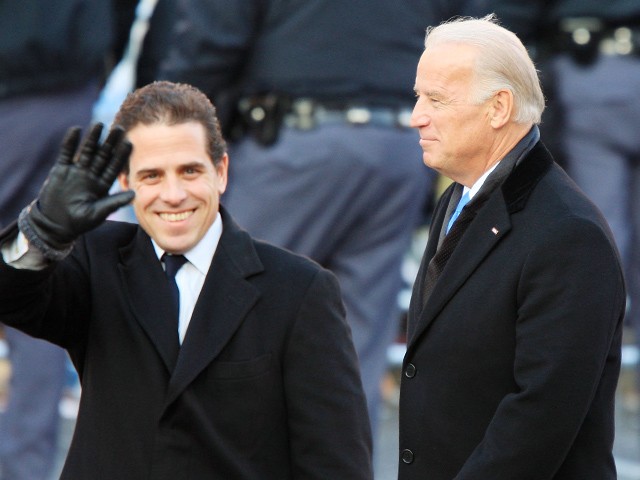
Vice President Joe Biden and son Hunter Biden walk in the Inaugural Parade January 20, 2009, in Washington, DC. (David McNew/Getty Images)
Some journalistic voices are urging a cease-and-desist on printing the truth about the Bidens; as one wrote recently, “Reporters should stop helping Donald Trump spread lies about Joe Biden and Ukraine.”
Yet the Biden candidacy is so ripe with juice—or so ripe with something—that reporters can’t stay away. For instance, Politico’s Ben Schreckinger has been working the Biden beat hard, coming up with investigative doozies such as, “Biden’s brother touted Biden Cancer Initiative ties in investment pitch: James Biden suggested the former vice president’s anti-cancer efforts could benefit potential investors, a litigant says. His spokesman denies it.”
Indeed, one prominent journo has concluded that Biden will end up as collateral damage in the coming impeach-o-rama; it’s hard to find more vivid phrasing than that of the Washington Post’s David von Drehle:
It was a terrible day for Biden, because while he was winning labor votes on the picket line, Democrats in Washington were freshly lathered over impeaching the president. And it appears they are going to feed Biden into a wood chipper. [Emphasis added]
Wood chipper? Ouch! It seems almost unnecessary to add that it’s hard to become the 46th president if you’ve been mashed into bloody fragments.
In other words, for all the Democrats’ cleverness, the one seemingly sure result of their new impeachment push is the wood-chipping of the man who has been regarded as their strongest presidential candidate.
Of course, if the name Bidengate were to stick—and it should—then maybe Biden was never, in reality, all that strong.
Or, to put the matter another way, maybe Trump is stronger than most observers have been willing to admit.

COMMENTS
Please let us know if you're having issues with commenting.